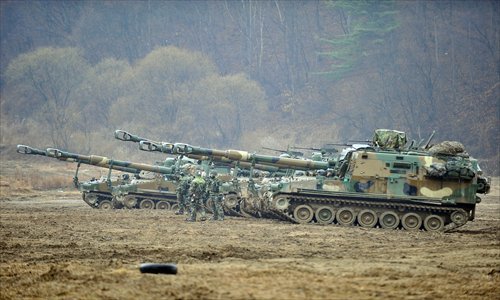NK revives nuclear reactor

UN Secretary-General Ban Ki-moon warned Tuesday that the North Korean crisis had gone "too far" after Pyongyang announced plans to reactivate a nuclear reactor amid the latest series of tit-for-tat escalation of tensions in the Korean Peninsula.
Analysts said the move is aimed at reaffirming its status as a nuclear state and rejecting any nuclear disarmament drive in the future, which could push the situation into a dangerous spiraling crisis that could run out of control.
"The current crisis has already gone too far. Things must calm down, as this situation could lead down a path that nobody should want to follow," Ban told reporters at a news conference in Andorra, where he was on an official visit, according to Reuters.
North Korea announced Tuesday it is to restart the Yongbyon nuclear reactor shut down six years ago to bolster its nuclear capability as the US military said it had deployed a guided-missile destroyer in waters off the Korean Peninsula.
In Beijing, Chinese foreign ministry spokesman Hong Lei said that China regrets North Korea's intention to reopen its nuclear facilities.
"We are calling for all parties concerned to remain calm and restrained, return to dialogue and consultation as soon as possible and jointly seek ways to appropriately resolve the issue," Hong said.
The decision to restart the Yongbyon nuclear complex was made at a plenary meeting of the Central Committee of the ruling Workers' Party of Korea on Sunday, a spokesman for North Korea's General Department of Atomic Energy, told the official KCNA news agency.
The country will "readjust" and "restart" all nuclear facilities at the complex, including a uranium enrichment plant and a 5MW graphite moderated reactor in order to cure the country's "acute" electricity shortage and "bolster the nuclear armed force both in quality and quantity," the spokesman said.
Seoul condemned Pyongyang's move as "highly regrettable," urging the north to abide by its past pledges of nuclear disarmament.
The Yongbyon nuclear reactor was shuttered in July 2007 under a denuclearization agreement of the Six-Party Talks and its cooling tower was also destroyed. But North Korea began reprocessing nuclear fuel rods at the site in late 2009.
Weapons-grade plutonium, which North Korea probably used as fissile material for its first and second nuclear tests in 2006 and 2009, could be produced by reprocessing nuclear fuel rods.
North Korea has linked its nuclear development with economic progress, and this creates difficulties for any international efforts to solve the crisis, Zhang Liangui, a specialist in Korean issues at the International Strategic Research Bureau at the Party School of the Central Committee of CPC, told the Global Times Tuesday.
"By restarting the Yongbyon nuclear reactor, North Korea wants to tell the world that its status as a nuclear nation is unchangeable and no longer negotiable and then force the international community to accept this and continue to grant aid to it," Zhang said. "But its demands are unlikely to be accepted."
Reuters quoted a US defense official as saying on Monday that the USS McCain, an Aegis-class guided-missile destroyer used for ballistic missile defense, was positioned off the peninsula's southwestern coast in response to North Korea's threat.
In another sign of the soaring tension, the US military has also moved a sea-based X-Band Radar platform to the Western Pacific Ocean from Hawaii to monitor North Korea's military movements.
"The US has deployed some of its most advanced weapons in the region to ramp up deterrence against North Korea and demonstrate its strong defense commitment to its allies South Korea and Japan," Jin Qiangyi, Director of the Asia Research Center with China's Yanbian University, told the Global Times Tuesday.
Washington earlier flew nuclear-capable B-52 and B-2 stealth bombers over the Korean Peninsula and deployed F-22 Raptor stealth fighters to South Korea to take part in the ongoing "Foal Eagle" war games.
Such tit-for-tat moves between North Korea and the US are pushing the peninsula situation toward a spiraling crisis that could run out of control as neither side has showed any signs of backing down, Jin said.
Agencies contributed to this story